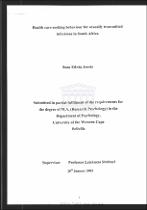Health care-seeking behaviour for sexually transmitted infections in South Africa
Abstract
The main aim of this study was to investigate the health care-seeking behaviour of patients who were diagnosed at primary health care clinics having a sexually transmitted infection (STI). It further aimed to discover whether any significant differences exist between rural and urban populations and between males and females in their health care-seeking behaviour. The study made use of an existing database. The methodology used in this study is referred to as secondary analysis. The data used in this study was obtained from 126 semi-structured interviews conducted with STI patients at 24 chronics, in all nine provinces. In addition, in-depth interviews were conducted with 28 STI patients. This sample consisted of 20 females and eight males. Interviews were unstructured and were aimed at discovering patients' perceptions, experiences and health care-seeking behaviour relating to STIs. All 126 participants were found to be symptomatic when they
presented at the clinic sites. The most popular reason given for attending the clinic sites was convenience. Most participants reported that they waited less than 7 days before they presented at the clinic sites. No significant differences were associated with delay in health care-seeking. Most participants had negative emotions regarding their illness. Few participants engaged in alternative treatment strategies. Some of the 28 STI patients who received in-depth interviews stated that they would not reveal their STI status for fear of the stigma associated with the disease. Use of alternate remedies and treatment options of were mentioned. The concern of persuading partners to seek treatment was also highlighted. The implications of these findings for improving the management of sexually transmitted diseases and reducing the spread of the disease are discussed.

